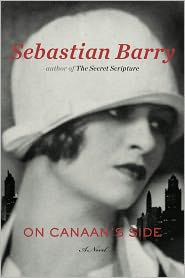
To put it simply: Sebastian Barry writes so beautifully, so poetically, that when I read his books I find myself almost ashamed to admit that I’m also a writer – and a jealous one at that. His prose is so deeply humane and so well-crafted that almost reads like verse; verse that makes you want to cry; no, not from sorrow, but from joy, for having the privilege of reading it. I’m not implying that the subject matters with which the good author is preoccupied are pleasant, quite the opposite, they float in sadness, yet the way he narrates them do not bring much sorrow to the reader’s heart. He seems, in a magical way, to grab the latter by the hand and lead him on to a journey through the wide paths of history, a history that touches everything and everyone in different ways; personal and impersonal at the same time.
On Canaan's Side is the story of Lilly Berre, an eighty-nine year old woman, whose grandson Bill just died, and who now just sits and writes down her memoirs, reliving through them a long life full of sorrows and a few touches of joy. The narrator talks in a direct and almost oral way about love and war, about country and home, and about loss, old age and death. And she doesn’t complain about anything, even just a little bit, although she has every right to do so, given the way the fates have treated her.
Her memories, despite her age, are crystal clear, as they are deeply engraved on her tortured soul. She remembers a father whom she loved too much, but whose choices have caused her endless troubles but also saved her life. She remembers her first big love, the man with whom she escaped from Ireland to America, just after the First World War, and whose face reminded her of a Van Gogh painting. She remembers her brother, like a hazy picture of times long gone and who died during that very same war. She remembers everything, and everything she writes, like a living testament, even though she says she hates writing. She needs to tell everything, to get it out of her breast, because: “We are not immune to memory.”
Even though “the past is a crying child”, as she writes somewhere in this seventeen day long monologue, she never cries: “I am cold because I cannot find my heart,” she’s quick to point out. However, she’s not really cold, she’s just hurt, as she’s lived an eventful life, but nevertheless poor where results were concerned. She worked a lot, she fought hard for a better tomorrow, she spent years and years in fear and whatever she won she lost, whomever she loved she buried. And yet not a single word of complain ever escapes her lips. Lilly is a woman full of patience, one of those unique and rarely met souls that can only feel compassion for the others, and who know how to forgive. One could say that her way of thinking and living sounds kind of fatalistic, and one would be wrong. Her memories are sad, but not bitter, and her memories are her life. Writing them down is what keeps her alive; her resilience is her power.
“Tears have a better character cried alone,” she thinks, and that’s why she mourns her loss on her own and in the quiet. And her tears turn into pearls of wisdom and humanity. As Joe, one of the main characters says, we “live in a big box of fear.” Lilly takes this fear and turns it into power; she takes that power and turns it into a story – the story we are now holding in our hands.
Absolutely brilliant.

No comments:
Post a Comment